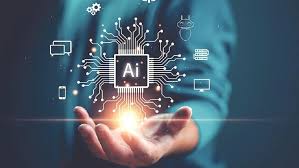The Growing Power of AI: Scope, Challenges & What Lies AheadScope: Where AI Is Making Its Mark
The Growing Power of AI: Scope, Challenges & What Lies Ahead
Scope: Where AI Is Making Its Mark
Artificial Intelligence (AI) is no longer the stuff of sci-fi—it’s woven into how we live, work, and think:
In healthcare, AI assists in diagnosing diseases, recommending personalized treatments, and even aiding surgeries. It’s accelerating drug discovery and improving patient outcomes.
Finance and customer service benefit from AI tools like fraud detection, algorithmic trading, and virtual assistants that provide round-the-clock support.
The transportation sector is embracing AI through autonomous vehicles, optimized routes, and predictive maintenance.
In agriculture, smart drones and sensors monitor crop health, optimize resources, and boost yield sustainably.
Industries like manufacturing, entertainment, and smart homes rely on AI for real-time automation, creative content generation, and personalized experiences.
Moreover, AI increasingly collaborates with other technologies like IoT, 5G, blockchain, and quantum computing, unlocking even more transformative possibilities.
Challenges: What Holds AI Back
Despite its promise, AI grapples with serious hurdles:
Bias, Fairness & Transparency
AI systems trained on unrepresentative data can perpetuate discrimination. Their “black-box” nature makes decision processes opaque, raising concerns over accountability. blog.wasimakram.in33rd SquareWikipedia
Privacy & Security Risks
The sheer volume of data AI consumes invites breaches and adversarial attacks. Developing strong defenses, like differential privacy methods and encrypted systems, remains crucial. blog.wasimakram.intheventurecation.comarXiv
Job Displacement & Workforce Shift
Automation threatens traditional roles, particularly in routine sectors. Yet AI also creates new opportunities—emerging fields like machine learning engineering, data science, and AI ethics consultants are growing fast. blog.wasimakram.intechnewsbazaar.comElectronics For YouTechGig
Ethics & Policy Gaps
Without global regulatory frameworks, misuse of AI—especially in deepfakes, surveillance, and autonomous weapons—remains a threat. Countries are moving toward regulation, but guidelines vary widely. blog.wasimakram.inTechGigWikipedia
Sustainability Concerns
Training large AI models demands extensive computing, causing substantial energy use. Green data centers and efficient algorithms are more important than ever. Wikipedia
Dependence on Big Tech
The infrastructure and tools for AI are mostly controlled by a handful of global tech companies, leading to vendor lock-in and potential risks in editorial independence and innovation. Wikipedia+1
Future Outlook: What Lies Ahead for AI
The future of AI is both exciting and complex:
Trustworthy, transparent AI (XAI) is becoming a priority. New frameworks focus on explainability, fairness, and continuous oversight. arXiv+1
Human-AI collaboration will define the next wave—machines augment human capabilities rather than replace them, especially in scientific discovery and creative fields. 33rd Square
Emerging governance and ethics regimes are in development, with international bodies and governments crafting AI-specific regulations and ethical standards. 33rd SquareTechGig
Accelerated adoption across sectors: AI is set to revolutionize education, healthcare, media, and more—provided it’s deployed responsibly and equitably. The Australian
Possible slow-downs ahead? Some experts warn of diminishing returns from current AI models and signs of a potential “AI winter” if innovation plateaus or investor enthusiasm cools.
n short, AI’s future is bright yet delicate. Its potential to revolutionize society is enormous—but success hinges on addressing ethical, social, and technical challenges head-on. Collaborative regulation, ethical design, and mindful innovation will determine whether AI elevates humanity or complicates its future.

